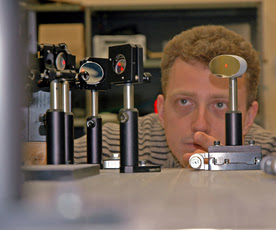
(Hat Tip: Space Scan)
With all of the difficulties of launching humanity into space, nothing compares to actually traveling through it. With cosmic radiation being a major threat towards us becoming a space faring species, the less time one spends traveling between worlds, the better off they may be.
Since chemical rockets are probably too slow (and too expensive) to ensure that we survive at the end of the journey, plasmoid thrusters may be able to provide the power (and hopefully the speed) for us to travel to Jupiter, Saturn and beyond.
(Phyorg.com) The Plasmoid Thruster Experiment (PTX) is a stepping stone to a highly efficient propulsion concept which could ultimately change how we travel in space, according to Dr. Jason Cassibry, a researcher in UAH's Propulsion Research Center.
"Larger, more powerful versions can produce fusion for both power and space propulsion, allowing human travel to the outer planets," he said. [...]
PTX works by ringing a single turn conical theta pinch coil at about 500 kHz, ionizing and accelerating a small quantity of gas. The magnetic field inside the coil creates a plasmoid, a plasma that has a closed magnetic field structure.
One of the biggest challenges in any electric propulsion concept is increasing the lifetime of the thruster, which must run continuously for several years for deep space missions. Most electric propulsion concepts use plasma, which is in contact with electrodes or acceleration grids, causing erosion of the components and limiting the lifetime of the thruster. The plasmoid thruster potentially has a much longer lifetime, because the plasma is formed inductively, which means that the plasma is not in contact with the thruster components.
If perfected, this technology could enable us to settle worlds as far as Neptune's Triton and Pluto. Although these researchers still have a long way to go, this idea seems to be a lot brighter than hitch hiking on asteroids.
Want more space geek news? Then subscribe below via email, RSS or twitter for free updates! Prefer another service? How about via RSS or follow Colony Worlds on Twitter!





No comments:
Post a Comment
You can either visit the stars or watch them from afar.
But if you choose the former, you'll definitely get a better view.
~Darnell Clayton, 2007
Note: You do not need a Blogger account in order to comment, but you do need to solve the universal puzzle below.